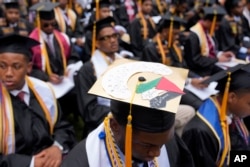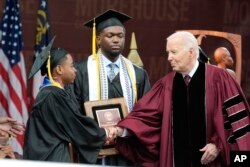Student Union
Chinese, Indian Students Make Up Half of Foreign Students in US
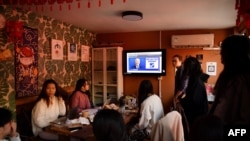
Students from China and India comprise half of all international students in the U.S., propelled by increased wealth in those countries and drawn by potential employment in America, education and immigration experts told VOA.
“The ratios are due largely to external demographic, geopolitical, and economic factors,” said Rachel Banks, senior director of public policy and legislative strategy at NAFSA: Association of International Educators. “It is largely driven by who can afford the cost of studying in the United States, as international students are not eligible for federal financial aid.”
China’s economy has grown markedly since opening to international trade in the 1970s and now stands as the second largest with a growing and more affluent middle class that can afford a foreign education.
“Manufacturing growth in China has raised a lot of Chinese incomes,” said Gaurav Khanna, an assistant professor of economics at the University of California-San Diego. “Now they can afford to come to the U.S.”
Chinese and Indian enrollment at U.S. colleges and universities swooped upward at the turn of the new century. In 2000, there were nearly 60,000 Chinese students in the U.S., and nearly 55,000 students from India. Student enrollment in U.S. schools from Japan and South Korea were not far behind.
By 2010, Chinese student enrollment had grown to almost 158,000 students in the U.S., with nearly 104,000 students from India, pulling far ahead of South Korea’s 73,000 students. Other nations sent even fewer.
In 2020, before drastic enrollment reductions due to the COVID-19 pandemic, there were more than 372,000 Chinese and 193,000 Indian students in the U.S., or 34% and 18%, respectively, of the 1,075,496 international students in the U.S., according to the Institute for International Education (IIE) headquartered in New York. Students from South Korea had dropped back to a distant third, sending close to 50,000, or 4.6% of the total in the U.S.
“China and India are the two most populous nations on the planet, and they generate large numbers of college-prepared students at a rate that their own higher education systems cannot meet,” Banks said. “So many students look abroad for higher education opportunities.”
“Until very recently, they didn't have kind of the next tier of good colleges in China,” said Khanna. “So students who couldn't get into the top, the top universities in China, would just say, let me go abroad.”
Bella Du, a recent Chinese graduate from American University in Washington, confirms Khanna’s explanation.
“More Chinese students want to study abroad, and America offers the opportunity of a very high-end university and resources that it provides,” she said.
When international students come to the U.S. for higher education, they bring billions in revenue — $41 billion in 2018-2019 — to the U.S., concentrated in regions where they are clustered: California, New York, New England (Massachusetts and Rhode Island), Upper Midwest (Illinois, Indiana, Wisconsin, Michigan), Texas, Washington D.C. and Washington state.
Their career paths are clustered, too: 77% of international students specialize in science, technology, engineering and math (STEM), which includes health professions.
“STEM (science, technology, engineering and math) and health research are more advanced in the U.S. than in most other countries,” said Arun Krishnavajjala, an Indian student earning his Ph.D. in computer science at George Mason University in Virginia. “STEM jobs, in particular, are fueled by big tech, and most of the largest tech companies reside in the U.S., therefore, almost always requiring a U.S.-based educational requirement.”
A majority of international students, not only Chinese or Indian, cite immigration pathways to employment as one of the top reasons for studying in the U.S.
“A lot of Indian students essentially use the U.S. education system as a way to gain access to the U.S. labor market,” said Khanna. “If you come and do your education in the U.S., then you're going to get hired from the campus in the U.S. essentially.”
While H1-B visas are highly coveted by foreign workers, they are not easy to get. Last year, 65,000 were available, with 20,000 additional issued to foreigners with a master’s degree or who graduated from a U.S. university, according to the American Immigration Council.
Without an H1-B visa, international students who have graduated or exhausted the Optional Practical Training (OPT) visa — which allows them to stay up to three years after graduation — cannot legally work in the U.S.
“I think it is hard for international students to find jobs in the United States if you do not have a green card,” said, Du, referring to legal permanent residency in the U.S. “So I think it only depends on the resources and opportunities. If I find a job here then I will stay in the United States if I don’t then I will go back to China.”
Krishnavajjala, who is in the U.S. on a student visa, agrees.
“This is an issue a lot of immigrants face. Green cards take decades to get now and the government's banter about legal and illegal immigrants leaves immigrants who have lived here their entire life here in limbo about their future,” he said. “The government's incompetence in immigration in the last decade has put people like me in a situation of paying international tuition and fearing deportation every year.”
Some experts suggest that another reason the U.S. admits high numbers of Chinese students is to expose them to American democracy.
“Chinese and Russian students always learn a great deal about American democracy and other aspects of our society when they come here, and they take that knowledge back home with them,” wrote former Ambassador William A. Rugh in American Diplomacy in August 2020.
“Exposure to our ‘soft power’ has more impact on them than any imagined negative impact they might have on Americans,” wrote Rugh, who served as a U.S. foreign service officer from 1964 to 1995.
Critics, however, see allowing a large Chinese student presence as enabling espionage and the theft of U.S. intellectual property, especially in technology and medical research.
In June, a bipartisan bill, the Safeguarding American Innovation Act, was introduced in the U.S. Senate. The legislation aims to prevent foreign competitors such as China from stealing intellectual property developed at U.S. colleges and universities by mandating additional scrutiny of applications for U.S. visas as well as federal research grants.
See all News Updates of the Day
- By VOA News
Siblings flourish at University of Cincinnati
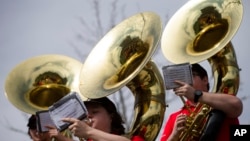
Two sets of siblings -- on from Kuwait and one from Saudi Arabia -- talk about their experiences as international students at the University of Cincinnati in the U.S. state of Ohio.
Read the story here. (April 2024)
Pro-Palestinian protesters set up a new encampment at Philadelphia's Drexel University

Pro-Palestinian protesters set up a new encampment at Drexel University in Philadelphia over the weekend, prompting a lockdown of school buildings, a day after authorities thwarted an attempted occupation of a school building at the neighboring University of Pennsylvania campus.
After several hundred demonstrators marched from Philadelphia's City Hall to west Philadelphia on Saturday afternoon, Drexel said in a statement that about 75 protesters began to set up an encampment on the Korman Quad on the campus. About a dozen tents remained Sunday, blocked off by barricades and monitored by police officers. No arrests were reported.
Drexel President John Fry said in a message Saturday night that the encampment "raises understandable concerns about ensuring everyone's safety," citing what he called "many well-documented instances of hateful speech and intimidating behavior at other campus demonstrations." University buildings were "open only to those with clearance from Drexel's Public Safety," he said.
Authorities at Drexel, which has about 22,000 students, were monitoring the demonstration to ensure it was peaceful and didn't disrupt normal operations, and that "participants and passersby will behave respectfully toward one another," Fry said.
"We will be prepared to respond quickly to any disruptive or threatening behavior by anyone," Fry said, vowing not to tolerate property destruction, "harassment or intimidation" of students or staff or threatening behavior of any kind, including "explicitly racist, antisemitic, or Islamophobic" speech. Anyone not part of the Drexel community would not be allowed "to trespass into our buildings and student residences," he said.
On Friday night, members of Penn Students Against the Occupation of Palestine had announced an action at the University of Pennsylvania's Fisher-Bennett Hall, urging supporters to bring "flags, pots, pans, noise-makers, megaphones" and other items.
The university said campus police, supported by city police, removed the demonstrators Friday night, arresting 19 people, including six University of Pennsylvania students. The university's division of public safety said officials found "lock-picking tools and homemade metal shields," and exit doors secured with zip ties and barbed wire, windows covered with newspaper and cardboard and entrances blocked.
Authorities said seven people arrested would face felony charges, including one accused of having assaulted an officer, while a dozen were issued citations for failing to disperse and follow police commands.
The attempted occupation of the building came a week after city and campus police broke up a two-week encampment on the campus, arresting 33 people, nine of whom were students and two dozen of whom had "no Penn affiliation," according to university officials.
On Sunday, dozens of George Washington University graduates walked out of commencement ceremonies, disrupting university President Ellen Granberg's speech, in protest over the ongoing siege of Gaza and last week's clearing of an on-campus protest encampment that involved police use of pepper spray and dozens of arrests.
The ceremony, at the base of the Washington Monument, started peacefully with fewer than 100 protesters demonstrating across the street in front of the Museum of African American History and Culture. But as Granberg began speaking, at least 70 students among the graduates started chanting and raising signs and Palestinian flags. The students then noisily walked out as Granberg spoke, crossing the street to a rapturous response from the protesters.
Students and others have set up tent encampments on campuses around the country to protest the Israel-Hamas war, pressing colleges to cut financial ties with Israel. Tensions over the war have been high on campuses since the fall but demonstrations spread quickly following an April 18 police crackdown on an encampment at Columbia University.
Nearly 3,000 people have been arrested on U.S. campuses over the past month. As summer break approaches, there have been fewer new arrests and campuses have been calmer. Still, colleges have been vigilant for disruptions to commencement ceremonies.
President Joe Biden told the graduating class at Morehouse College on Sunday, which included some students wearing keffiyeh scarves around their shoulders on top of their black graduation robes, that he heard their voices of protest and that scenes from the conflict in Gaza have been heartbreaking. Biden said given what he called a "humanitarian crisis" there, he had called for "an immediate cease-fire" and return of hostages taken by Hamas.
The latest Israel-Hamas war began when Hamas and other militants stormed into southern Israel on Oct. 7, killing around 1,200 people and taking an additional 250 hostage. Palestinian militants still hold about 100 captives, while Israel's military offensive has left more than 35,000 people in Gaza dead, according to the territory’s health ministry, which doesn't distinguish between civilians and combatants.
Biden tells Morehouse graduates that he hears their voices of protest over war in Gaza
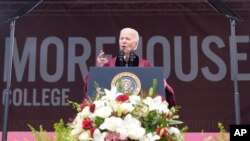
President Joe Biden on Sunday told the graduating class at Morehouse College that he heard their voices of protest over the Israel-Hamas war, and that scenes from the conflict in Gaza have been heartbreaking.
"I support peaceful nonviolent protest," he told students, some who wore keffiyeh scarves around their shoulders on top of their black graduation robes. "Your voices should be heard, and I promise you I hear them."
The president told the crowd that it was a "humanitarian crisis in Gaza, that's why I've called for an immediate cease-fire to stop the fighting" and bring home the hostages taken when Hamas attacked Israel on Oct. 7. The comments, toward the end of his address that also reflected on American democracy and his role in safeguarding it, were the most direct recognition to U.S. students about the campus protests that have swept across the country.
Morehouse's announcement that Biden would be the commencement speaker drew some backlash among the school's faculty and supporters who oppose Biden's handling of the war. Some Morehouse alumni circulated an online letter condemning school administrators for inviting Biden and soliciting signatures to pressure Morehouse President David Thomas to rescind it.
The letter claimed that Biden's approach to Israel amounted to support of genocide in Gaza and was out of step with the pacifism expressed by Martin Luther King Jr., Morehouse's most famous graduate.
The Hamas attack on southern Israel killed 1,200 people. Israel's offensive has killed more than 35,000 Palestinians in Gaza, according to local health officials.
Some members of the graduating class showed support for Palestinians in Gaza by tying keffiyeh scarves around their shoulders on top of their black graduation robes. One student draped himself in a Palestinian flag. On the stage behind the president, academics unfurled a Democratic Republic of Congo flag.
The country has been mired in an ongoing civil war that has plunged the nation into violence and displaced millions of people. Many racial justice advocates have called for greater attention to the conflict and for greater attention in the US to the conflict as well as American aid in ending the violence.
"Thank you God for this 'woke' class of 2024 that is in tune with the zeitgeist, the spirit of the times," the Rev. Claybon Lea Jr. said during a prayer at the start of the commencement.
The class valedictorian, DeAngelo Jeremiah Fletcher, said at the close of his speech that it was his duty to speak on the war in Gaza and that it was important to recognize that both Palestinians and Israelis have suffered.
"From the comfort of our homes, we watch an unprecedented number of civilians mourn the loss of men, women and children, while calling for the release of all hostages he said. "It is my stance as a Morehouse man, nay as a human being, to call for an immediate and permanent cease-fire in the Gaza Strip."
Biden stook and shook his hand after Fletcher finished.
The speech, and a separate one Biden is giving later Sunday in the Midwest, is part of a burst of outreach to Black constituents by the president, who has watched his support among these voters soften since their strong backing helped put him in the Oval Office in 2020.
After speaking at Morehouse in Atlanta, Biden will travel to Detroit to address an NAACP dinner.
Georgia and Michigan are among a handful of states that will help decide November's expected rematch between Biden and Republican former President Donald Trump. Biden narrowly won Georgia and Michigan in 2020 and needs to repeat — with a boost from strong Black voter turnout in both cities.
Biden spent the back end of the past week reaching out to Black constituents. He met with plaintiffs and relatives of those involved in Brown v. Board of Education, the landmark 1954 Supreme Court decision that outlawed racial segregation in public schools. He also met with members of the "Divine Nine" Black fraternities and sororities and spoke with members of the Little Rock Nine, who helped integrate a public school in Little Rock, Arkansas, in 1957.
In Detroit, Biden was set to visit a Black-owned small business before delivering the keynote address at the NAACP's Freedom Fund dinner, which traditionally draws thousands of attendees. The speech gives Biden a chance to reach thousands of people in Wayne County, an area that has historically voted overwhelmingly Democratic but has shown signs of resistance to his reelection bid.
Wayne County also holds one of the largest Arab American populations in the nation, predominantly in the city of Dearborn. Leaders there were at the forefront of an "uncommitted" effort that received over 100,000 votes in the state's Democratic primary and spread across the country.
A protest rally and march against Biden's visit are planned for Sunday afternoon in Dearborn. Another protest rally is expected later that evening outside Huntington Place, the dinner venue.
US remains top choice for Indian students going abroad
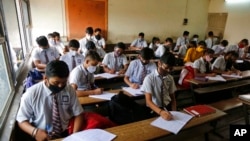
About 69% of Indian students traveling abroad for their studies chose the United States, according to a Oxford International’s Student Global Mobility Index. Other popular choices were the United Kingdom, Canada and Australia.
Education Times reports the main influencers for deciding where to study abroad – for Indian students and others – were parents. (April 2024)
Malaysian official: Schools can’t turn away from global tensions
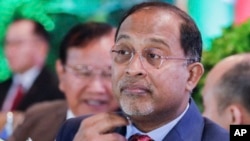
Zambry Abdul Kadir, Malaysia’s higher education minister, said protests spreading across universities in the United States show that schools can’t ignore political tensions.
Helen Packer, reporting in Times Higher Education, said the minister reminded educators that universities are key in the development of leaders, individuals and societies. (April 2024)







